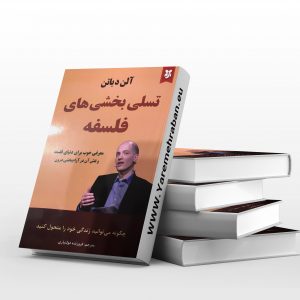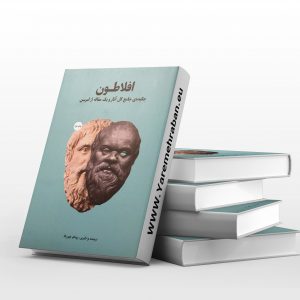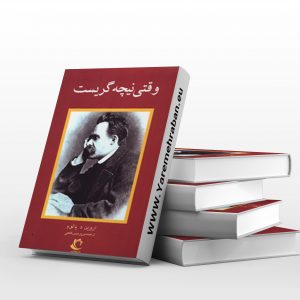Description
The book is the six treatises of Plato, which has been translated by Mohammad Ali Foroughi and published by Hermes.
Plato, the founder of the Platonic school and the first institution of higher education in the Western world. He, along with Socrates and his most famous student, Aristotle, were one of the most important and influential people in the history of mankind. These three are mentioned as central figures in the history of ancient Greek and Western philosophy.
Plato was the originator of written dialogue and dialectical forms in philosophy. Plato is also considered the founder of Western political philosophy. His most famous contribution is the theory of forms known to pure reason, in which Plato offers a solution to the problem of generalities known as Plato (vaguely called either Platonic realism or Platonic idealism).
Six treatises
Unlike almost all of his contemporaries, the entire work of Plato is thought to have survived for more than 2,400 years.
Aristotle claimed that Plato’s philosophy closely followed the teachings of Pythagoras, and Cicero reiterated this claim: “They say that Plato learned everything from Pythagoras.”
Pythagoras believed that everything is a number and that the universe is derived from numerical principles. He introduced the concept of form as distinct from matter, and that the physical world is an imitation of the eternal mathematical world. These ideas greatly influenced Heraclitus, Parmenides, and Plato.
Some of these famous treatises are: In defense of Socrates, Phaedo, Charmides, Creton, Federus, Menon and ….
In general, “Six Treatises” by Plato has been collected and translated here.
Plato (427-347 BC), Greek philosopher and one of the most influential thinkers in the human world. He was born into a noble family in Athens, studied with Socrates, and after his death, traveled for a while and lived for a while in Syracuse.
On his return to Athens, Plato founded the academy, where he spent the rest of his life teaching. His disciples and followers also gathered there, and for this reason his philosophy has become known as academic philosophy.
His philosophy is written in conversation and expressed in his treatises. Plato did not attribute any of his research to himself. In his works, Socrates is always the first speaker, and in fact, Plato is the name of Socrates in everything he writes, because there are no works left from Socrates.
Some of these famous treatises are: In defense of Socrates, Phaedo, Kharmides, Creton, Federus, Menon, etc. Mohammad Ali Foroughi (author) , Has translated the conversation of Aqriton and the conversation of Phaedo. In addition to the biography of Plato and his philosophy, the two treatises of Alcibiades and Gorgias are also included in the book.
The Epistle of Alcibiades is one of Socrates’ conversations in which a young man seeks a dialogue between Socrates and Alcibiades, and Socrates intends to make him understand that if you want to rule the country, you must focus on good and evil, strife, good and corruption, and profit. Loss of knowledge.
In Gorgias, Socrates also discusses with Gorgias and two of his followers. And he argues about the fruitlessness but also the harmfulness of the rhetoric, as they usually do, and makes all three one silent.
Plato, the founder of the Republic of Thought
Six treatises
Plato’s ideas still remain deeply motivating and interesting. What unites these ideas is their ambition and idealism.
Athens was an adventurous and dense city about 2400 years ago; About 250,000 people lived there and enjoyed the city’s many theaters, temples, markets, and sports fields. Art and science were flourishing and everything seemed perfect. It was in this city and context that Plato, the world’s first — and perhaps greatest — philosopher, was born.
Six treatises
“The lowest level of cognition is the imagination, which first contains images and shadows, and then the reflection of tangible objects in water and in hard and smooth objects. After that, it is the level of belief that realizes the tangible things of the living and the non-living.
Imagination and belief are both related to the recognition of the tangible world and arise from the imagination. “Beyond that is rational reasoning and science, which are the steps of recognizing the world of meaning, and arising from understanding, rational reasoning leads to the knowledge of mathematics, and science makes it possible to know ideas.”
Born into a wealthy and wealthy family, he dedicated his life to one goal: to help humans reach a state he called εὐδαιμονία or “Yodmonia”; A Greek word that can be understood to mean “feeling satisfied with life”; Satisfaction exists in man in both good and bad conditions — which are an inevitable part of life.
But what ways does Plato suggest to achieve this feeling of satisfaction? In this regard, four fundamental ideas in his works attract attention:
Six treatises
1- To think wiser.
Plato states that our lives are often troubled because we almost never give ourselves enough time to think carefully and wisely about our decisions. And because of this, we get bad values, relationships, and jobs.
Plato wanted to create order and clarity in the minds of his audience. He realized that many of our opinions and judgments stem from the thinking of society, from what the Greeks call “doxa” or “ruling common sense.”
In the 36 books he wrote, Plato repeatedly showed that this “ruling common sense” could be full of error, discrimination, and superstition, and that common ideas about love, fame, money, or goodness did not fit well with logic and reality. .
Plato also realized how arrogant humans are dominated by their instincts and emotions, and compared them to people being dragged back and forth by wild horses with their eyes covered.
As Sigmund Freud acknowledges, Plato was the inventor of “therapy” and insisted that his audience analyze all their feelings and thoughts from a logical and rational point of view. As Plato has repeatedly stated, the essence of philosophy is only one thing: “Know thyself.”
2- Make love wiser.
Plato is one of the greatest theorists of relationships. The Feast can be considered Plato’s attempt to explain the true meaning of love. This book tells the story of a banquet hosted by Agathon, a charming and handsome poet.
Agathon invites a group of friends to get together, eat and drink, and talk about love. Each guest has a different opinion about the meaning and what love is.
Plato has come up with the best and most compelling theory for his old friend Socrates, who is one of the main characters in this book and his other works: When we fall in love with a person, he actually sees good qualities in that person. We do not exist in ourselves.
Maybe our lover is a calm person and we get mad too soon, or that he is able to speak very pleasantly and eloquently when we can not do that.
The dream behind the concept of love is that by approaching such people, we can become a little like them. For Plato, love is a form of education.
He believes that someone who literally loves another person will want to be made a better person by his lover. This means that one must be with someone who has a lost part of his being: good qualities that we ourselves lack.
Plato asks us to accept that we are not perfect and to be willing to cultivate the good qualities of others.
Six treatises
3- The importance of beauty
It can be said that everyone loves beautiful things. Plato believed that it was very important to know what houses and temples, as well as decorative objects and sculptures were around you. No one before Plato had asked this key question: Why do we love beautiful things? And he managed to find an answer to this question: because in them we find some of the “virtues”.
There are many good concepts we want to experience; Such as kindness, respect, order, balance, peace, power and self-esteem. These attributes are related to people, but they can also be attributed to objects.
It is very shocking and exciting for us to see the good but absent features of our lives in the beauties of the outside world. Because of this, beautiful objects have a very important function. They invite us to walk in their path of beauty and become like them. According to Plato, beauty can educate the human soul.
Plato goes on to say that ugliness is just as important, because it reveals dangerous and harmful traits before our eyes. Plato sees art as a therapeutic tool, and the task of poets and painters (and today novelists, filmmakers, and all artists in general) is to help improve the lives of human beings.
Six treatises
4- Changing the society
Plato spent much time thinking about what an ideal government and society should look like. He is in fact the first idealist (and utopian) thinker in the world. His main inspiration for paying attention to the ideal society was Athens’s great rival, the city / government of Sparta. Sparta was like a factory that produced famous warriors.
Everything the Spartans did — the way children were raised, the structure of the economy, the patterns, the norms, and the cultural issues — all served the same purpose of producing soldiers. And of course, they were extremely successful militarily.
But this was not Plato’s concern. He wanted to know how a society could increase its “Yudmonia” or sense of life satisfaction instead of developing military power. How can it create a sense of satisfaction in the people of a society?
In The Republic, Plato outlines four changes that must be made to increase popular satisfaction:
– We need new heroes
Athenian society focused mainly on the rich and its famous athletes. Plato believed that it is very important who we admire, because celebrities influence our appearance, thoughts and behavior. And bad heroes can promote personality weaknesses.
For this reason, Plato wanted to introduce new “celebrities” to Athens and replace the famous ones with wise and noble ones.
He calls these wise men “guardians” and considers them role models for enhancing the positive qualities of others. These people are distinguished from others by their positive track record in public service, humble demeanor and simple habits, and their vast and valuable experiences, and are the most admired and respected individuals in society.
Six treatises
No need for censorship
Today, censorship (in various forms and limits) has many pros and cons. Plato in his day was concerned with the “wrong kind of freedom” because in Athens, anyone could promote any theory.
Mad religious ideas and seemingly pleasant but dangerous ideas stirred the enthusiasm of the masses, forcing the Athenians into captive to catastrophic regimes and unwise wars (such as the fateful invasion of Sparta).
According to Plato, being constantly exposed to a storm of different sounds and orientations is not good for people at all. So he wanted to limit the activities of dangerous public speakers and preachers. If Plato were alive today, he would no doubt be very pessimistic about the influence of the mass media.
We should watch over all artists and craftsmen and not let them show bad qualities such as unrestrainedness, ugliness and ugliness, whether in painting or in other works they create, and if they can not work according to this rule, they should be removed. We are open to creating works of art …
Better education of six treatises
Plato had a firm belief in education but wanted to reform the curricula of educational institutions.
He believed that the main thing that human beings should first learn is not only mathematics and spelling, but that learning how to be “good” is just as important. Plato believes that we need to learn a lot about courage, self-control, rationality, independence and peace.
To put his ideas into practice, Plato founded a school called the “Academy” in Athens, which flourished for more than four hundred years …
1- Introducing the book on YouTube
2- Introducing the book in Aparat














Reviews
There are no reviews yet.